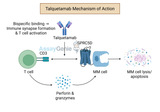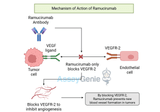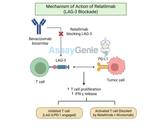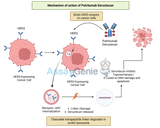Blog
Unveiling Prezalumab: Targeting the Role of Anti-CD47 in Cancer Immunotherapy
What You Need to Know About PrezalumabWhat is Prezalumab?Prezalumab is a monoclonal antibody designed to target CD47, a protein often overexpressed in cancer cells to evade immune detection. It is being investigated for its potential in cancer immunotherapy.What is the mechanism of action for Prezalumab?Prezalumab works by blocking the CD47 pathway, which helps tumors evade immune attack. By inhibiting CD47, Prezalumab enhances the immune system’s ability to recognize and destroy cancer cells.What are the clinical applications of Prezalumab?Prezalumab is being explored in the treatment of various cancers, including hematological malignancies and solid tumors, to harness the imm
…
6th Feb 2025
Alsevalimab: Targeting CD47 for Cancer Research and Treatment
Quick Facts About AlsevalimabWhat is Alsevalimab?Alsevalimab is a monoclonal antibody targeting CD47, a protein involved in immune evasion by cancer cells. By blocking CD47, Alsevalimab enhances the immune system's ability to recognize and attack tumors.What is the mechanism of action for Alsevalimab?Alsevalimab binds to CD47, preventing its interaction with SIRPα receptors on macrophages. This disrupts the "don't eat me" signal that helps tumors evade immune detection, thereby promoting anti-tumor immune responses.What are the clinical applications of Alsevalimab?Alsevalimab is being explored in clinical trials for various cancers, including solid tumors and hematologic malign
…
6th Feb 2025
Lemzoparlimab: Targeting CD47 for Cancer Immunotherapy Advancements
Quick Facts About LemzoparlimabWhat is Lemzoparlimab?Lemzoparlimab is a monoclonal antibody that targets CD47, a protein known for its role in helping tumors evade the immune system. By binding to CD47, Lemzoparlimab facilitates immune recognition and destruction of cancer cells.What is the mechanism of action for Lemzoparlimab?Lemzoparlimab binds to CD47 on cancer cells, blocking the "don’t eat me" signal that prevents the immune system from attacking tumors. This enhances macrophage-mediated phagocytosis of cancerous cells.What are the clinical applications of Lemzoparlimab?Lemzoparlimab is being explored in clinical trials for its efficacy in treating hematologic cancers, in
…
6th Feb 2025
Zilovertamab: Unlocking the Potential of ROR1-Targeted Therapy
Quick Facts About ZilovertamabWhat is Zilovertamab?Zilovertamab is a monoclonal antibody targeting ROR1, a receptor tyrosine kinase overexpressed in hematologic cancers and solid tumors.How does Zilovertamab work?It binds to ROR1, disrupting tumor cell survival pathways and enhancing immune-mediated cancer cell destruction.What are the clinical applications of Zilovertamab?It has been investigated for treating chronic lymphocytic leukemia (CLL), mantle cell lymphoma (MCL), and other malignancies.Are there biosimilars for Zilovertamab?Yes, biosimilars are being explored to enhance research accessibility and further therapeutic advancements.1.) Understanding ZilovertamabZilo
…
6th Feb 2025
Rovalpituzumab Tesirine: Advancing Small Cell Lung Cancer Research
Quick Facts About Rovalpituzumab TesirineWhat is Rovalpituzumab Tesirine?Rovalpituzumab Tesirine (Rova-T) is an antibody-drug conjugate (ADC) designed to target DLL3, a protein overexpressed in small cell lung cancer (SCLC) cells.How does Rovalpituzumab Tesirine work?It binds to DLL3, delivering a cytotoxic agent that induces tumor cell death while sparing healthy cells.What are the clinical applications of Rovalpituzumab Tesirine?It has been studied in SCLC and other DLL3-expressing cancers, with research focused on improving efficacy and reducing toxicity.1.) Understanding Rovalpituzumab TesirineRovalpituzumab Tesirine, commonly referred to as Rova-T, is an investigational an
…
6th Feb 2025
Trastuzumab: Revolutionizing HER2-Positive Cancer Treatment & Research
Quick Facts About TrastuzumabWhat is Trastuzumab?Trastuzumab is a monoclonal antibody used to treat HER2-positive breast and gastric cancers. It specifically targets the HER2 protein, reducing tumor growth and improving survival rates.How does Trastuzumab work?Trastuzumab binds to the HER2 receptor on cancer cells, blocking growth signals and triggering immune responses that destroy tumor cells.What are the clinical applications of Trastuzumab?It is FDA-approved for HER2-positive breast cancer and metastatic gastric cancer, often used in combination with chemotherapy.Is Trastuzumab safe?While generally well-tolerated, it may cause side effects like cardiotoxicity and infusion r
…
6th Feb 2025
Unlocking the Potential of Anti-CD47 in Cancer Immunotherapy
Quick Facts About RagifilimabWhat is Ragifilimab?Ragifilimab is an investigational anti-CD47 monoclonal antibody developed to block the CD47-SIRPα interaction, thereby enhancing macrophage-mediated phagocytosis of cancer cells.How Does Ragifilimab Work?By inhibiting CD47, Ragifilimab prevents cancer cells from evading immune detection, promoting their destruction through immune-mediated mechanisms.What Are the Clinical Applications of Ragifilimab?Ragifilimab is being explored for its efficacy in treating hematologic malignancies and solid tumors, including non-small cell lung cancer and lymphoma.1.) Understanding RagifilimabRagifilimab represents a novel approach in cancer immu
…
6th Feb 2025
Canakinumab: Unraveling Its Role in Inflammatory Disease and Cancer Research
Quick Facts About CanakinumabWhat is Canakinumab?Canakinumab is a human monoclonal antibody that targets interleukin-1 beta (IL-1β), reducing inflammation associated with various diseases.How Does Canakinumab Work?It neutralizes IL-1β, a key inflammatory mediator, preventing downstream inflammatory responses that contribute to conditions like systemic juvenile idiopathic arthritis (sJIA), periodic fever syndromes, and cardiovascular disease.What Are the Clinical Applications of Canakinumab?Canakinumab is FDA-approved for treating autoinflammatory syndromes, including sJIA, cryopyrin-associated periodic syndromes (CAPS), and familial Mediterranean fever (FMF). It has also shown
…
5th Feb 2025
Vesencumab: Unlocking the Potential of Anti-CD47 in Cancer Research
Quick Facts About VesencumabWhat is Vesencumab?Vesencumab is an experimental monoclonal antibody designed to target CD47, a key regulator of immune evasion in cancer cells.How Does Vesencumab Work?By blocking CD47, Vesencumab enhances macrophage-mediated phagocytosis, enabling the immune system to recognize and eliminate cancer cells more effectively.What Are the Clinical Applications of Vesencumab?Vesencumab is being explored for its role in treating various malignancies, including hematologic cancers and solid tumors.Is Vesencumab Safe?Preliminary studies suggest that Vesencumab is well-tolerated, though research continues to optimize its safety profile and minimize off-targe
…
4th Feb 2025
Talquetamab: Exploring its Role in Cancer Therapy and Ongoing Research
Quick Info Section: Key Facts About TalquetamabWhat is Talquetamab?Talquetamab is a novel monoclonal antibody being developed for the treatment of multiple myeloma and other cancers. It targets GPRC5D, a protein expressed on the surface of myeloma cells, aiming to stimulate the body's immune system to attack and destroy the tumor cells. What is the mechanism of action of Talquetamab?Talquetamab works by binding to GPRC5D on myeloma cells and engaging T-cells through CD3, directing them to destroy the cancer cells. This bispecific antibody utilizes immune system activation to fight cancer more efficiently.What are the clinical applications of Talquetamab?Talquetamab is prim
…
2nd Feb 2025
Naratuximab: Redefining Cancer Therapy with Precision Medicine
Quick Facts About NaratuximabWhat is Naratuximab?Naratuximab is an anti-CD37 monoclonal antibody-drug conjugate (ADC) designed to target B-cell malignancies, particularly non-Hodgkin lymphoma (NHL).How does Naratuximab work?It binds to the CD37 protein on the surface of B cells, delivering a cytotoxic payload to eliminate cancerous cells while sparing healthy ones.What are the clinical uses of Naratuximab?Naratuximab is primarily investigated for treating relapsed or refractory B-cell lymphomas, with promising results in clinical trials.1.) Understanding NaratuximabNaratuximab represents a groundbreaking advancement in antibody-drug conjugate (ADC) therapy, specifically designe
…
1st Feb 2025
Ramucirumab: Mechanism, Clinical Applications, and Biosimilars in Cancer Research
Quick Facts About RamucirumabWhat is Ramucirumab?Ramucirumab is a monoclonal antibody that targets vascular endothelial growth factor receptor 2 (VEGFR-2), inhibiting angiogenesis, a process crucial for tumor growth.How Does Ramucirumab Work?It blocks VEGFR-2 signaling, preventing blood vessel formation that tumors need to grow and spread, making it effective in various cancers.What Are the Clinical Applications of Ramucirumab?It is approved for treating advanced gastric cancer, non-small cell lung cancer (NSCLC), and colorectal cancer, often in combination with chemotherapy.What Are the Side Effects of Ramucirumab?Common side effects include hypertension, proteinuria, fatigue,
…
31st Jan 2025
Cabiralizumab: Unlocking the Potential of Anti-CSF1R Therapy
What You Need to Know About CabiralizumabWhat is Cabiralizumab?Cabiralizumab is a monoclonal antibody targeting the colony-stimulating factor-1 receptor (CSF1R), developed for treating cancer and immune-mediated diseases.What is the mechanism of action for Cabiralizumab?Cabiralizumab works by inhibiting CSF1R signaling, reducing macrophage-mediated immune suppression in tumors and promoting anti-tumor immunity.What are the clinical applications of Cabiralizumab?It is being investigated for its potential in treating pancreatic cancer, tenosynovial giant cell tumor (TGCT), and immune-related diseases like PVNS.1.) Understanding CabiralizumabCabiralizumab (FPA008) is a monoclonal
…
31st Jan 2025
Icatolimab: Revolutionizing the Fight Against Cancer via CD47 Targeting
Quick Facts About IcatolimabWhat is Icatolimab?Icatolimab is a monoclonal antibody designed to target CD47, a protein that cancer cells use to evade immune detection.How does Icatolimab work?By blocking CD47, Icatolimab enables macrophages to recognize and eliminate cancer cells, enhancing the immune system's response.What are the clinical applications of Icatolimab?Icatolimab is primarily investigated for treating hematological malignancies and solid tumors, with promising results in emerging studies.1.) Understanding IcatolimabIcatolimab represents a significant advancement in immuno-oncology, focusing on the immune checkpoint CD47. CD47 functions as a "don’t eat me" signal,
…
31st Jan 2025
Relatlimab: Unlocking the Potential of LAG-3 Inhibition in Cancer Research
Quick Facts About RelatlimabWhat is Relatlimab?Relatlimab is a monoclonal antibody that targets LAG-3 (Lymphocyte Activation Gene-3), a key immune checkpoint involved in T-cell regulation.How Does Relatlimab Work?Relatlimab blocks LAG-3, enhancing T-cell activity and improving immune responses against cancer, particularly when combined with PD-1 inhibitors.What Are the Clinical Applications of Relatlimab?It is primarily used in treating melanoma, especially in combination with nivolumab, for patients with advanced or unresectable tumors. 1.) Understanding RelatlimabRelatlimab is a next-generation immune checkpoint inhibitor that targets Lymphocyte-Activation Gene 3 (LAG-3)
…
29th Jan 2025
Bevacizumab: Mechanism, Clinical Applications, and Biosimilar Insights
Quick Facts About BevacizumabWhat is Bevacizumab?Bevacizumab is a monoclonal antibody that targets vascular endothelial growth factor (VEGF), inhibiting angiogenesis (the formation of new blood vessels) to restrict tumor growth.How does Bevacizumab work?It binds to VEGF, preventing it from interacting with its receptors on endothelial cells, thereby reducing blood supply to tumors and slowing their progression.What are the clinical applications of Bevacizumab?Bevacizumab is used in the treatment of multiple cancers, including colorectal, lung, and ovarian cancers, as well as certain eye conditions such as age-related macular degeneration.What are the common side effects of Beva
…
29th Jan 2025
Patritumab Deruxtecan: Mechanism, Clinical Applications, and Biosimilar Advances
Quick Facts About Patritumab DeruxtecanWhat is Patritumab Deruxtecan?Patritumab Deruxtecan (HER3-DXd) is an investigational antibody-drug conjugate (ADC) targeting HER3, a receptor implicated in various cancers, including non-small cell lung cancer (NSCLC) and breast cancer.How Does Patritumab Deruxtecan Work?This ADC binds to HER3-expressing tumor cells, delivering a topoisomerase I inhibitor payload that induces targeted cell death.What Are the Clinical Applications of Patritumab Deruxtecan?Emerging research explores its efficacy in NSCLC, breast cancer, and other HER3-expressing malignancies. Recent trials focus on its potential in overcoming resistance to standard therapies
…
29th Jan 2025
Ruplizumab: Unveiling the Role of Anti-CD47 in Cancer Research
Quick Facts About RuplizumabWhat is Ruplizumab?Ruplizumab is an investigational monoclonal antibody designed to target CD47, a protein that helps cancer cells evade immune detection.What is the mechanism of action for Ruplizumab?Ruplizumab works by inhibiting the interaction between CD47 and its receptor, SIRPα, thereby enabling immune cells to recognize and attack tumor cells more effectively.What are the clinical applications of Ruplizumab?Ruplizumab is being studied primarily for its role in treating various cancers, including hematologic and solid tumors, through its immune-modulating effects.1.) Understanding RuplizumabRuplizumab is an investigational monoclonal antibody e
…
29th Jan 2025
Brodalumab: A Breakthrough in IL-17 Receptor Blockade for Psoriasis and Beyond
Quick Facts About BrodalumabWhat is Brodalumab?Brodalumab is a monoclonal antibody that targets the IL-17 receptor to treat immune-mediated conditions like moderate-to-severe plaque psoriasis.What is the mechanism of action of Brodalumab?It blocks IL-17 receptor A, inhibiting downstream signaling pathways involved in inflammatory responses.What conditions does Brodalumab treat?Brodalumab is approved for psoriasis, psoriatic arthritis, and is being studied for other autoimmune disorders.Is Brodalumab safe?While generally well-tolerated, it carries a REMS program due to risks of suicidal ideation in some patients. Always consult healthcare professionals for guidance.1.) Understan
…
29th Jan 2025
Adalimumab: Mechanism, Clinical Applications, and the Role of Biosimilars
Quick Facts About AdalimumabWhat is Adalimumab?Adalimumab is a fully human monoclonal antibody designed to neutralize tumor necrosis factor-alpha (TNF-α), a key cytokine involved in inflammation.How does Adalimumab work?Adalimumab binds to TNF-α, preventing its interaction with receptors, thereby reducing inflammation and improving autoimmune disease management.What conditions does Adalimumab treat?Adalimumab is used to treat rheumatoid arthritis, psoriatic arthritis, Crohn’s disease, ulcerative colitis, plaque psoriasis, and ankylosing spondylitis.Is Adalimumab safe?Adalimumab has a well-documented safety profile but may cause side effects such as infections, injection site re
…
29th Jan 2025
Cetuximab: A Revolutionary Drug in Cancer Therapy
Quick Facts About CetuximabWhat is Cetuximab?Cetuximab is a monoclonal antibody targeting the epidermal growth factor receptor (EGFR), widely used in cancer therapy.How does Cetuximab work?Cetuximab binds to EGFR on cancer cells, inhibiting cell proliferation and inducing apoptosis, making it a powerful tool in oncology.What are the clinical uses of Cetuximab?It is commonly prescribed for metastatic colorectal cancer and squamous cell carcinoma of the head and neck, often in combination with chemotherapy or radiation.Is Cetuximab safe?Cetuximab is generally well-tolerated, but common side effects include skin rash and infusion reactions.1.) Understanding CetuximabCetuximab, a c
…
29th Jan 2025
Utomilumab: Advancing Immuno-Oncology Research
Quick Facts About UtomilumabWhat is Utomilumab?Utomilumab is a monoclonal antibody targeting 4-1BB (CD137), a co-stimulatory receptor on T-cells, designed to enhance anti-tumor immunity.What is the mechanism of action for Utomilumab?Utomilumab binds to 4-1BB, stimulating T-cell activation and proliferation while promoting an enhanced immune response against cancer cells.What are the clinical applications of Utomilumab?It has been investigated in combination therapies for cancers such as non-small cell lung cancer (NSCLC) and melanoma, aiming to improve immune checkpoint therapy outcomes.1.) Understanding UtomilumabUtomilumab represents a pivotal development in immuno-oncology a
…
29th Jan 2025
Bersanlimab: Revolutionizing Cancer Research with Anti-CD47 Therapeutics
What You Need to Know About BersanlimabWhat is Bersanlimab?Bersanlimab is a cutting-edge anti-CD47 monoclonal antibody designed to disrupt cancer cells' evasion of immune detection.What role does Bersanlimab play in targeting CD47?It inhibits CD47—a “do not eat me” signal used by cancer cells—to enhance macrophage-mediated phagocytosis and immune response.What are the clinical applications of Bersanlimab?Bersanlimab is under investigation for treating hematologic malignancies and solid tumors by restoring the immune system’s ability to fight cancer effectively.1.) Understanding BersanlimabBersanlimab represents a significant advancement in immuno-oncology, specifically within t
…
29th Jan 2025
Labetuzumab: Revolutionizing Cancer Research with Targeted Therapies
Quick Facts About LabetuzumabWhat is Labetuzumab?Labetuzumab is a monoclonal antibody targeting CEACAM5, a protein overexpressed in various cancers, primarily colorectal carcinoma.How does Labetuzumab work?By binding to CEACAM5, Labetuzumab delivers cytotoxic agents directly to cancer cells, minimizing damage to healthy tissue.What are its clinical applications?Labetuzumab is primarily used in cancer treatment research, including colorectal cancer and other CEACAM5-positive malignancies.Is Labetuzumab discontinued?Some variants, like Labetuzumab govitecan, have been discontinued, but they remain vital in understanding targeted drug design.1.) Understanding LabetuzumabLabetuzuma
…
29th Jan 2025























